African leaders focus on economy and security as they address the United Nations General Assembly
Several African leaders are attending the United Nations General Assembly meetings in New York, which runs from September 19-25. In their addresses to the General Assembly, African leaders focused on the economic and security challenges facing the continent. President Jacob Zuma of South Africa focused on global economic imbalances noting that the “current structure of the global economy continues to deepen the divide between the global north and global south.” Similarly, President Hage Geingob of Namibia discussed rising income disparities as the “greatest threat for peace within countries and globally.”
Security challenges and successes in Africa were also discussed during the assembly speeches. Secretary-General Antonio Guterres stressed that the slow and delayed implementation of the Agreement on Peace and Reconciliation in Mali was concerning. President Alassane Ouattara of Côte d’Ivoire highlighted the successful U.N. and French peacekeeping operations in his country as an inspiration for the United Nations to increase its initiatives. President Macky Sall of Senegal addressed the fight against terrorism and called for global efforts to “work together to find concerted solutions to the scourge.”
In the lead-up to the United Nations General Assembly, last week Australia and Ghana proposed a motion titled “Responsibility to protect and the prevention of genocide, war crimes, ethnic cleansing and crimes against humanity” to be included in the official agenda for this week. Namibia and Zimbabwe along with 19 other countries voted to exclude it from the agenda while 112 countries voted for it and 17 abstained. The Namibian government explained its vote as a procedural one and noted that it was “not necessarily against the substance of the motion.” Despite objections, the motion passed and was included in the agenda for the 72nd U.N. General Assembly.
African cocoa markets face separate challenges from smugglers and Brexit
In addition to dealing with lower global cocoa prices, regional price differences have also hurt cocoa farmers. There is a $27 price difference in a bag of cocoa beans between Ghana and Côte d’Ivoire. Together, the two countries produce 60 percent of the world’s cocoa crop. Traders have been driving through the porous Côte d’Ivoire-Ghana border in order to acquire the desired commodity at a cheaper price, causing the Ghanaian market to be flooded by cheap cocoa beans, leading to a decline in income for Ghanaian cocoa farmers. While cross-border illicit trade is hard to quantify, estimates show that 70,000 tons of cocoa beans were illegally smuggled in Ghana this season, making up 7 percent of Ghana’s annual cocoa production. The price difference between the two countries can be attributed to a fixed price policy by Côte d’Ivoire, which sets prices before the harvest. This policy has encouraged Ivorian growers to plant new cocoa plants and has led to an increase in the amount of production and a reduction in the average cost of production.
This week, the Ivorian prime minister raised concerns over Brexit’s impact on cocoa prices. The commodity is traded in pounds on the London market, while the CFA franc, Cote d’Ivoire’s currency, is pegged to the euro. The fall of the value of the pound in relation to the euro, a 12 percent decline since last June’s U.K. referendum, has weakened cocoa revenues.
In related monetary news, the peg of the CFA franc, the currency of the West African Economic and Monetary Union, to the euro has raised concerns among activists in certain West Africa countries. This week, protesters gathered in several West African capital to protest the Euro ties. Interviewed Senegalese traders complained about the CFA frank’s tie to its former colonizer and the lack of independence it entails. Prior to being pegged to the Euro the CFA franc was pegged to the French franc. This week’s events are not the first wave of protests against the CFA franc. Last month, Beninese youths burned the CFA franc in support of Kemi Seba, a Franco-Beninese activist who was arrested in Dakar for burning the currency.
Kenya’s Supreme Court releases full judgment while election commission announces new election date
On Wednesday, September 20, Kenya’s Supreme Court released its full judgement explaining its September 1 decision to nullify the results of the August 8 presidential election. The judges called the vote “neither transparent nor verifiable” and faulted the country’s Independent Electoral and Boundaries Commission (IEBC) for failing to transmit the election results in line with electoral rules. According to the judges’ findings, the IEBC announced the winner of the election before receiving forms from the 40,883 polling stations—forms which are legally required to validate ballots—and therefore may not have used the forms as dictated by electoral law. Moreover, following the opposition’s claims that the election had been hacked, the court stated the IEBC failed to comply with a court order for the electronic voting system to be scrutinized by the court. Since the IEBC denied the court access to the computer servers, the court was compelled to accept the opposition’s claims that the system was tampered with or hacked, which led the judges to void the vote. The judges did not claim that any hacking necessarily occurred, but rather that it was impossible to verify the results of the election due to the IEBC’s non-compliance with electoral laws.
The judges’ decision stated that the IEBC must follow the electoral laws in future elections. They also reaffirmed that the re-run must be held within 60 days of the decision to nullify the original vote on September 1. IEBC Chairman Wafula Chebukati identified October 17 as the date for the re-run. However, the opposition National Super Alliance (NASA) coalition has stated it will boycott the poll if current IEBC officials are not sacked, and a new team is not hired to run the next poll. Furthermore, the French company OT-Morpho that provided the voting kits for the original election has stated that it must reconfigure more than 40,000 kits before the re-run, which will take at least until the end of October—surpassing the current date for the re-run and potentially even the 60-day constitutional deadline.
A day after the Supreme Court released its detailed judgment, Kenya’s election commission announced that the presidential election re-run will now take place on October 26 instead of the initially announced October 17.
The Brookings Institution is committed to quality, independence, and impact.
We are supported by a diverse array of funders. In line with our values and policies, each Brookings publication represents the sole views of its author(s).

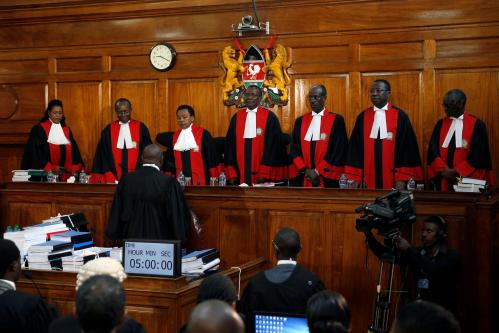
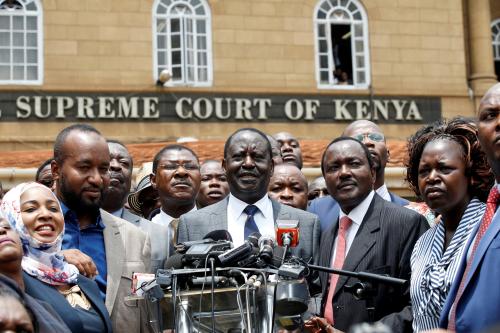
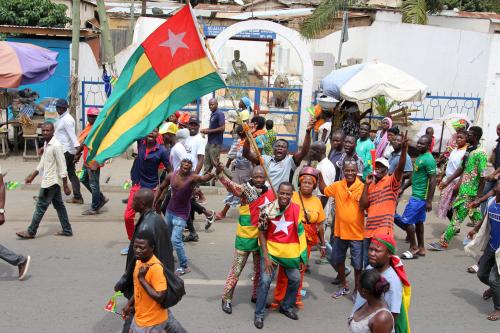


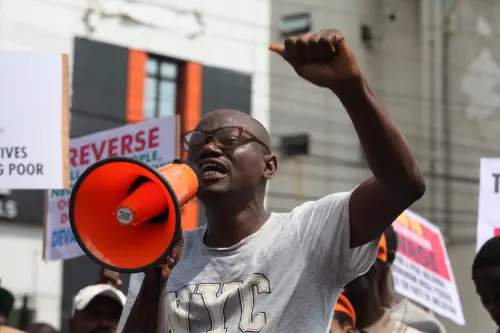
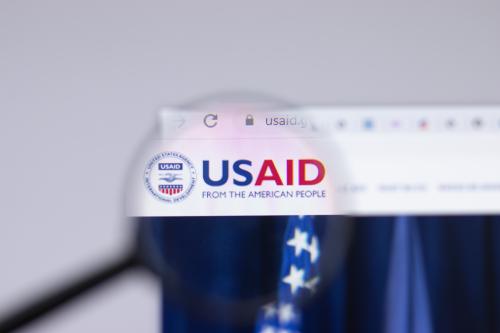
Commentary
Africa in the news: UNGA updates, cocoa export challenges, and Kenya’s full Supreme Court ruling
September 22, 2017